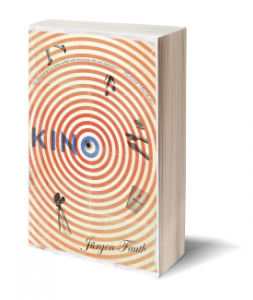Review by Christopher Allen
I’m off to Zurich for the weekend, but I’ve brought along some work for the ride. Jürgen Fauth’s Kino arrived yesterday. I’m apprehensive. Jürgen is the co-creator of Fictionaut. What if I don’t like the book? Until I open it, I have no idea what it’s about—except for the word Kino, which I know means cinema in German.
My apprehension does not last long. In the second paragraph of the novel, I have found myself in an action-packed mystery thriller, a page-turner with a gutsy, young and less than perfect woman in the leading role. I am curious, even excited. Later in the evening as I’m exploring the old town of Zurich, my thoughts keep turning to Kino—a story destined for the cinema.
Returning home from the hospital where her husband is languishing with dengue fever, Wilhelmina Koblitz (Mina) stumbles over two mysterious metal cases left on her doorstep. The contents of the “cans” turn out to be her grandfather’s long-lost film Tulpendiebe (The Tulip Thief), which can only be viewed on a special projector in Berlin. So the action begins—and this is only page 4.
Kino is, however, much more than an action-packed mystery page-turner. At its core, Kino is a complex family drama, a story of how the excesses—the sins?—of one generation poison those to come. Mina goes to Berlin with the hope of selling her grandfather’s films, of paying off student loans, of buying a house. She is not motivated by the need to resurrect her grandfather’s work or by a mission to wash the Nazi smear from his name; but through twists and turns, canyons and even a sauna, Mina finally becomes her grandfather’s savior.
Kino is also the nickname of Mina’s grandfather, an infamous German filmmaker from the Weimar Republic and later Nazi Germany. Parts of the story are told through Kino’s journal, which is handed to Mina by a stranger who stalks her through Berlin. This multi-voice layer of Kino takes the story on rails back to the Weimar Republic and the Third Reich, but the reader is never quite sure if the ramblings of Klaus Koblitz are true or the lies of a man ruined by his own twisted vision. He writes the journal in a mental hospital in 1963 after being committed by his wife, the Weimar Republic filmstar Penelope Greifenau Koblitz, who is without a doubt the most colorfully drawn character in the novel. When this book is adapted for film, elderly actresses will be climbing over one another to grab this role. Once a beautiful ingenue, Penelope is now a bitter drug addict with a foul mouth. Kino and his movies have ruined her, or maybe she ruined Kino?
Penelope is convinced that her husband had the ability to anticipate real future events through his films. And she’s not the only one. The Nazis and the US government are also interested in getting their hands on Kino’s films. An intriguing aspect of the novel, mind control, on one level, is a comment on the power of film; on another level it’s a deconstruction of the relationship between cause and effect. Kino keeps asking the question “who ruined whom”? Who is responsible for the deterioration of this family? The Nazis? Penelope? Kino? Drugs? And then who will redeem it?
Christopher Allen, a native of Tennessee, lives in Germany. His fiction and creative non-fiction have appeared in numerous places both online and in print. In 2011, Allen was a Pushcart Prize nominee and a finalist at Glimmer Train. He blogs at www.imustbeoff.com.

No Comments
Leave a Comment
trackback address